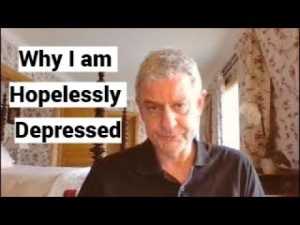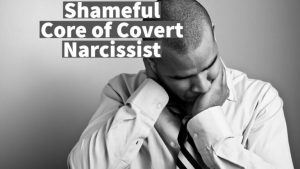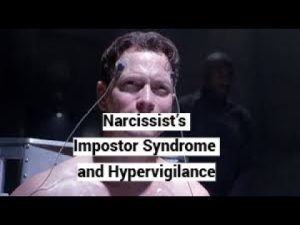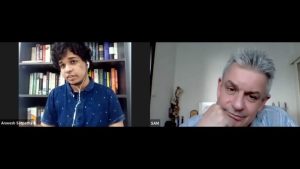Halloween: Paranormal Treat or Narcissist’s Trick? (The Nerve with Maureen Callahan)
Introduction and Context
- The meeting was a Halloween edition of The Nerve focused on paranormal and unexplained phenomena. Sam Vaknin, a professor of psychology and author, joined to discuss human impulses towards meaning beyond rationality and science [00:00].
Origins of Paranormal Beliefs and Human Need for Meaning
- Logic and rationality often fail to provide meaning and hope, especially in times of grief and isolation, leading humans to adopt supernatural or paranormal beliefs as coping mechanisms [02:30].
- These beliefs provide narratives and explanatory frameworks that make individuals feel more at home in the universe, contrasting with the alienation caused by objective logic which views the universe as random and uncaring [04:00].
Current Trends: Universe as a Secular God
- Modern popular culture attributes guiding powers to the universe, reflecting magical thinking and grandiosity, based on the idea that thoughts or wishes can influence reality (law of attraction, manifesting) [07:20].
Historical Perspectives on Paranormal and Science
- Until the 19th century, there was no strict distinction between normal and paranormal; notable scientists like Newton engaged in astrology and alchemy [10:40].
- The rise of scientism marginalized paranormal and religious beliefs despite their psychological importance and functions [12:30].
Psychological Underpinnings of Paranormal Experiences
- Believers often confuse internal experiences with external reality, akin to psychotic features, but paranormal experiences do not necessarily indicate psychosis [14:50].
- Paranormal experiences can be temporary breaks with reality and involve hallucinations arising from internal-external boundary confusion [16:20].
Case Studies and Research on Paranormal Claims
- Children commonly have imaginary friends that fulfill social and psychological functions; these might explain detailed paranormal-like accounts [18:00].
- Over decades, extensive research (including the Princeton lab and Stephenson’s projects) found only one unexplained case out of thousands of studied paranormal claims, involving a case of supposed past-life memories verified in India [19:20].
- Such rare cases challenge prevailing scientific paradigms and the dismissal of paranormal phenomena [22:30].
William James and Arthur Conan Doyle on Paranormal Phenomena
- Both prominent rationalists became more open to paranormal phenomena after personal grief, indicating the role of emotional context in shaping beliefs [23:00].
Science, Scientism, and the Limits of Knowledge
- Science is a method of inquiry, not a source of absolute truth; all scientific answers are temporary and prone to falsification [27:30].
- The distinction between science and technology is crucial; technology provides practical answers, while science constantly questions and revises ideas [33:30].
- Topics like the existence of God or consciousness are undecidable propositions for science and inherently beyond scientific resolution [36:40].
Misattribution of Arousal as Explanation for Paranormal Experiences
- Psychological experiments show physiological arousal (e.g., increased heart rate via substances) can be misattributed by subjects to feelings like love or paranormal events [38:50].
- Paranormal phenomena frequently correlate with stress, grief, or anxiety, suggesting a psychophysiological basis [40:00].
Debate on Paranormal Phenomena and Observer Effect
- The question whether paranormal events are real or brain artifacts remains open; parallels drawn with quantum mechanics’ observer effect suggest observer dependency [43:20].
- Sam Vaknin disputes orthodox quantum interpretations but acknowledges the metaphysical similarities [46:10].
Psychological Roots: The Oceanic Feeling and Early Development
- Paranormal beliefs and experiences may reflect a regressive desire to return to a pre-individuated symbiotic state with the mother (the “oceanic feeling”) [47:40].
- Trauma of separation and individuation, including awareness of being separate from the world, prompts the creation of alternate realities such as superstition and paranormal beliefs [49:20].
Religious Symbolism and Birth Trauma
- Myths like Noah’s Ark may metaphorically represent birth trauma; near-death experiences might re-experience birth according to Carl Jung’s theory [50:40].
- The psychological need for connection and security drives belief systems merging mystical and religious elements [52:00].
Personal Reflection on Religion and Rationality
- Sam Vaknin describes himself as a strong rationalist and agnostic with no need for religion or supernatural explanations, emphasizing intellectual humility and acceptance of the universe’s indifference [56:10].
Christopher Hitchens on Death and Rationality
- Hitchens’ stoic atheism as he faced terminal cancer rejects religious consolation and the notion that fear drives belief [57:10].
- He denounces religious prayers aimed at conversion rather than healing, describing this as a form of blackmail [58:00].
Critique of Scientism and Scientific Hubris
- Scientism is likened to a religion that dismisses paranormal phenomena a priori, limiting scientific inquiry and preventing serious study [59:40].
- Historical examples like Einstein rejecting quantum mechanics illustrate resistance to ideas that challenge materialistic views [61:50].
Paranormal Phenomena as Real Experiences
- Paranormal phenomena are real as subjective experiences but may or may not have objective existence outside the brain; scientific study of these phenomena is hindered by taboo and institutional closures like Princeton’s lab [63:10].
- The importance of expanding scientific inquiry to include human experiences and phenomena currently considered supernatural or paranormal [64:40].
Meditation, Brain Science, and Acceptance of Alternative Experiences
- Meditation initially resisted by Western science is now recognized for its physiological impact, demonstrating science’s evolving nature and potential to embrace other phenomena [65:50].
UFO Phenomena and Rationality
- UFO experiences are increasingly discussed in serious scientific and military contexts despite a lack of belief from the speaker, illustrating changing attitudes to anomalous phenomena [67:20].
Closing Reflections on Science and Inquiry
- The meeting ended on the note that denying phenomena’s existence is the worst way to approach understanding, emphasizing the necessity of humility and expanded scientific perspectives on paranormal and human experiences [70:20].
All timestamps correspond approximately to the minute:second mark in the provided transcript.






